pfSense vs UniFi Dream Machine Pro: 2026 Comparison Guide
Updated 2026 comparison: pfSense (Netgate 4200/6100) vs UDM Pro/Pro Max. Real throughput benchmarks, pricing, Shadow Mode vs CARP, WireGuard performance, and which firewall wins for your business.

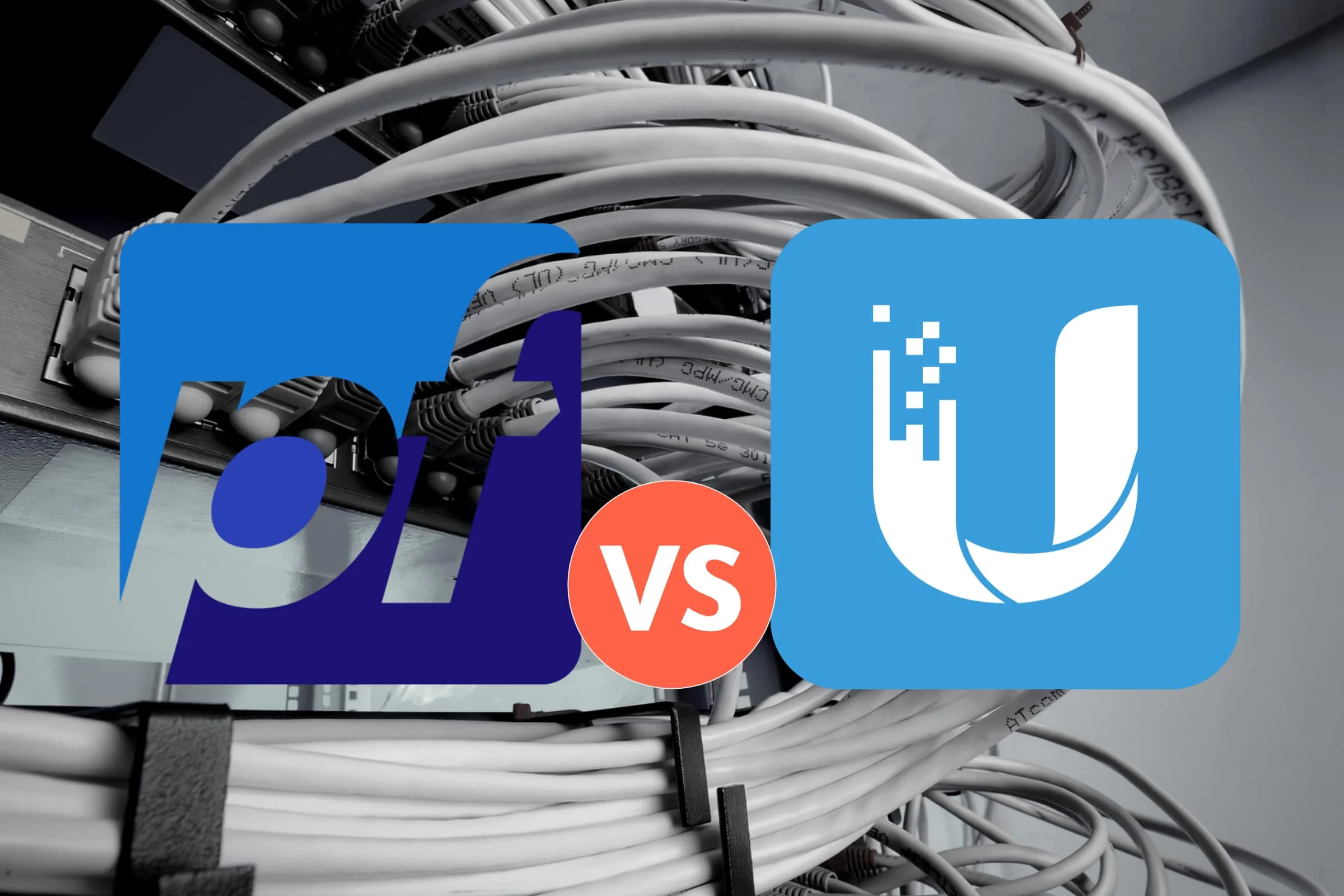
Is pfSense or UniFi Dream Machine Better for 2026?
Verdict: Use UDM Pro/Max for Ease of Use
For 90% of businesses, the UDM Pro Max is superior due to its 5 Gbps throughput, integrated NVR, and no annual fees. Choose pfSense (Netgate) only if you require complex routing protocols (BGP/OSPF), distinct physical interfaces for 5+ WANs, or non-UniFi hardware integration.
In January 2026, the gap has narrowed, with Ubiquiti addressing key deficits in High Availability and VPN protocols. The UDM Pro ($379) and Pro Max ($599) now support high-availability (Shadow Mode), WireGuard VPN, and multi-gig routing. However, pfSense (specifically Netgate appliances like the 4200/6100) offers granular control with detailed firewall rules, robust BGP support, and package add-ons (like pfBlockerNG) that UniFi cannot match.
The choice depends on your technical requirements and operational preferences. UniFi excels in ease of deployment and integrated surveillance, while pfSense provides superior flexibility for complex routing scenarios and SSL/TLS inspection capabilities.
For additional context, see our UniFi Business Network Guide or Gateway Comparison.
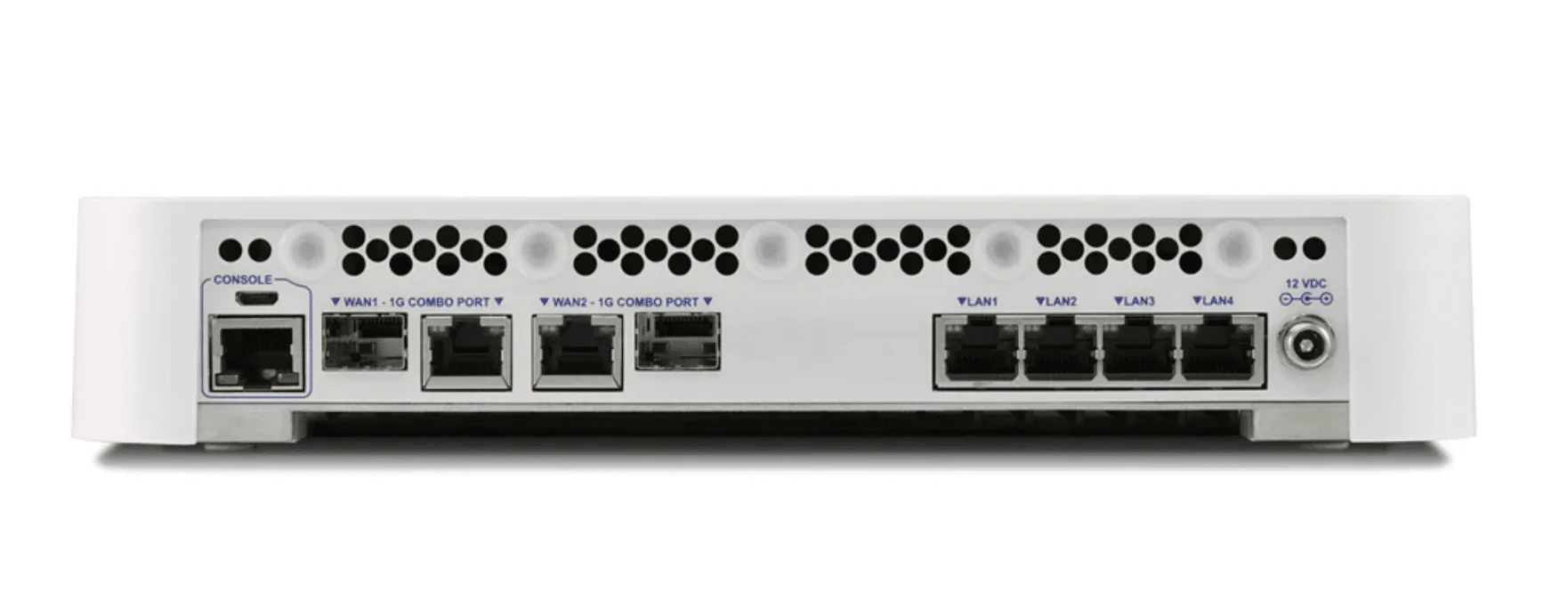
How Do UDM Pro Specs Compare to Netgate Appliances?
Winner: UniFi for Price-to-Performance
The UDM Pro ($379) offers 3.5 Gbps security throughput. To match this speed on official Netgate hardware, you must buy the Netgate 6100 (~$849). DIY pfSense builds can be cheaper but lack official support and warranty.
The raw hardware comparison often favors Ubiquiti in terms of throughput-per-dollar.
2026 Hardware Lineup
UniFi Dream Machine Series:
- UDM Pro ($379): Rack-mountable 1U. Includes 3.5 Gbps IDS/IPS throughput, 8-port switch, and NVR storage bay.
- UDM Pro Max ($599): Doubles capacity to 5 Gbps IDS/IPS and adds a second drive bay for RAID storage. Read our full review.
- Cloud Gateway Max ($199): Entry-level option with 2.5G ports and full UniFi OS stack, but no built-in switch or NVR bays. Choose UDM Pro Max over UCG-Max if you need rackmount form factor, HDD bays for surveillance, or built-in switching.
Netgate pfSense Appliances:
- Netgate 4200 ($599): Desktop form factor. Excellent 9-10 Gbps pure routing (L3 forwarding), but drops to ~3 Gbps with heavy IDS/IPS packages (Suricata/Snort) enabled. View at Netgate.
- Netgate 6100 ($849): Rack-ready 1U appliance with flexible 10G SFP+ ports and ~6 Gbps firewall performance. Note: Released in 2021/2022, making it an older platform compared to the UDM Pro Max. View at Netgate.
Hardware Comparison Table
| Model | Price | Form Factor | IDS/IPS Throughput | Routing Throughput | Built-in Switch | NVR Support |
|---|---|---|---|---|---|---|
| UDM Pro | $379 | 1U Rack | 3.5 Gbps | 10 Gbps | 8-port 1G | Yes (1 bay) |
| UDM Pro Max | $599 | 1U Rack | 5 Gbps | 10 Gbps | 8-port 2.5G | Yes (2 bays) |
| Netgate 4200 | $599 | Desktop | ~3 Gbps | 10 Gbps | No | No |
| Netgate 6100 | $849 | 1U Rack | ~6 Gbps | 10 Gbps | No | No |
DIY pfSense Option
The UDM series requires Ubiquiti hardware. pfSense allows you to bring your own hardware (BYOH), meaning you can repurpose an old Dell OptiPlex with a 4-port NIC for under $200. However, DIY builds lack official Netgate support, are limited to pfSense CE (not Plus), and may require significant time investment for troubleshooting.
Ready to build your network? Explore UniFi Gateways or browse Netgate appliances.
Pro Tip: Port Flexibility
Netgate 6100 vs UDM Pro Max Port Density:
The Netgate 6100 offers discrete, assignable ports - you can configure any port as WAN or LAN, making it ideal for multi-WAN setups or complex routing scenarios. The UDM Pro Max has fixed port groups (1x WAN, 8x LAN), limiting flexibility but simplifying configuration. For businesses requiring 3+ WAN connections or custom port assignments, the 6100's flexibility justifies the higher cost.

Is UniFi OS Easier to Use Than pfSense Plus?
Answer: Yes, Significantly
UniFi uses a graphical "Single Pane of Glass" dashboard ideal for visual management and quick changes. pfSense uses a text-heavy, tabbed interface that exposes every variable, requiring networking knowledge to navigate safely.
UniFi OS: Set and Forget
UniFi OS is designed for "set and forget" network management:
- Visual Dashboard: VLANs are created in seconds and automatically tagged across all connected UniFi switches and APs. The interface is visual, showing topology maps and client icons.
- Simplified Configuration: Common tasks like port forwarding, VPN setup, and firewall rules use guided wizards with dropdown menus.
- Integrated Ecosystem: Seamlessly manages UniFi switches, access points, and security cameras from a single interface.
- Limitation: "Hiding the complexity" means you cannot tweak specific kernel parameters or access the full JSON configuration file easily. Advanced routing protocols (BGP, OSPF) are not supported.
- Logging Weakness: UniFi's firewall logs lack the granular detail that pfSense provides. Real-time packet inspection and detailed connection logs are limited compared to pfSense's comprehensive logging capabilities.
pfSense Plus: Pure Utility
pfSense Plus offers maximum control for network engineers:
- Package System: Install packages like Snort (IDS), Squid (Proxy), HAProxy (Load Balancing), and pfBlockerNG (DNS filtering) directly from the web interface.
- Granular Control: Create firewall rules based on specific packet headers, FQDN aliases, or GeoIP blocking. Configure advanced NAT scenarios (one-to-one, outbound, port forwarding) with precision.
- Routing Protocols: Full support for BGP, OSPF, and RIP for enterprise-grade routing scenarios.
- Learning Curve: The text-heavy interface requires understanding of networking fundamentals. Misconfiguration can lock you out of the system.
Interface Comparison
| Feature | UniFi OS | pfSense Plus |
|---|---|---|
| Setup Time | 15-30 minutes | 1-3 hours |
| VLAN Creation | Visual drag-and-drop | Manual interface assignment |
| Firewall Rules | Simplified templates | Full iptables-style control |
| VPN Setup | Wizard-based | Manual configuration |
| Package Add-ons | None | 50+ available |
| Topology View | Real-time visual map | Text-based status pages |
Does pfSense Have Monthly Fees?
Answer: Generally, No
pfSense CE (Community Edition) is free for any hardware. pfSense Plus is only free when included with Netgate hardware purchases or via paid TAC Lite subscription - DIY builds cannot use pfSense Plus for free. UniFi OS has zero software licensing fees for core functionality, regardless of business size.
UniFi Cost Breakdown
- Hardware Cost: Fixed ($379–$599 for UDM Pro/Max)
- Software Cost: $0 for core UniFi OS
- Optional Costs: UniFi Identity Enterprise (advanced VPN/LDAP features) costs per user for enterprise deployments
- Hidden Costs: You must use UniFi Access Points and Switches to get the full benefit of the dashboard. A complete small office setup typically runs $1,500-$2,500.
- NVR Savings: The UDM Pro replaces a separate NVR (saving ~$300-$500), which pfSense cannot do.
pfSense Cost Breakdown
- Hardware Cost: Variable ($0 to $1,500+)
- DIY build - $200-$400 (used PC + NIC)
- Netgate 4200 - $599
- Netgate 6100 - $849
- Software Cost: $0 (CE only for DIY) or included with hardware (Plus)
- Hidden Costs: "Time." Configuring VLANs, rules, and VPNs on pfSense takes 3-4x longer than on UniFi (estimate based on typical deployments). Professional support (TAC) starts at $399/year.
Total Cost of Ownership (3 Years)
| Scenario | UniFi | pfSense (Netgate) | pfSense (DIY) |
|---|---|---|---|
| Hardware | $599 (UDM Pro Max) | $849 (6100) | $300 (used PC) |
| Software | $0 | $0 | $0 |
| Support | Community only | $399/yr optional | Community only |
| Admin Time | ~5 hrs/year | ~15 hrs/year | ~20 hrs/year |
| 3-Year Total | $599 | $849-$2,046 | $300 |
Where to Buy
UniFi:
- UDM Pro - Ubiquiti Store
- UDM Pro Max - Ubiquiti Store
- Cloud Gateway Max - Ubiquiti Store
- All UniFi Gateways
pfSense:
- Netgate Store - Official hardware with pfSense Plus included
- pfSense CE Download - Free Community Edition for DIY builds
Shadow Mode vs CARP: High Availability in 2026
High availability (HA) ensures network uptime by automatically failing over to a backup device if the primary fails.
UniFi Shadow Mode (2025+)
Introduced in late 2025, Shadow Mode allows two UDM Pro Max units to operate in active-passive HA:
- Setup: Simplified wizard-based configuration
- Failover Time: ~5-10 seconds (improved with UniFi OS 4.x/5.x firmware)
- Sync: Automatic configuration synchronization via VRRP
- Limitation: Requires two identical UDM Pro Max units ($1,198 total)
- Status: Maturing rapidly; early sync issues largely resolved in 2026 firmware
pfSense CARP (Common Address Redundancy Protocol)
pfSense has offered CARP for over a decade:
- Setup: Manual configuration of virtual IPs and sync interfaces
- Failover Time: <1 second (sub-second failover)
- Sync: XML-RPC configuration sync + pfsync for state table replication
- Flexibility: Works with any two compatible pfSense devices
- Maturity: Battle-tested in enterprise environments
Verdict
For Mission-Critical Networks: pfSense CARP remains superior with sub-second failover and decade-proven reliability.
For Simplicity: UniFi Shadow Mode is significantly easier to configure and has matured considerably in 2026, making it viable for most business environments.
SSL/TLS Inspection: Enterprise Security Gap
For enterprise environments requiring deep packet inspection of encrypted traffic, there's a significant capability gap.
pfSense SSL Inspection
pfSense can perform TLS/SSL inspection using packages like Squid with SSL Bump:
- Capability: Decrypt, inspect, and re-encrypt HTTPS traffic
- Use Cases: Content filtering, malware detection in encrypted streams, compliance monitoring
- Complexity: Requires certificate management, proxy configuration, and client trust store updates
- Performance Impact: Significant CPU overhead; reduces throughput by 40-60%
UniFi SSL Inspection
UniFi cannot easily inspect encrypted traffic:
- Limitation: No native SSL/TLS inspection capability
- Workaround: Must use external proxy servers or third-party solutions
- Impact: Businesses requiring encrypted traffic inspection must deploy additional infrastructure
Verdict
If your business requires SSL/TLS inspection for compliance (HIPAA, PCI-DSS) or advanced threat detection, pfSense is the only viable option between these two platforms. UniFi's simplified approach sacrifices this enterprise-critical feature.
Need compliance-ready network security? Contact us for pfSense deployment or explore UniFi for standard business needs.
WireGuard VPN Performance Benchmarks
Both platforms now support WireGuard, the modern VPN protocol that outperforms OpenVPN.
Real-World Throughput Tests (Jan 2026)
| Device | WireGuard Throughput | OpenVPN Throughput | IPsec Throughput |
|---|---|---|---|
| UDM Pro | ~1.5 Gbps | ~400 Mbps | ~2 Gbps |
| UDM Pro Max | ~2.5 Gbps | ~600 Mbps | ~3.5 Gbps |
| Netgate 4200 | ~2 Gbps | ~500 Mbps | ~3 Gbps |
| Netgate 6100 | ~3 Gbps | ~800 Mbps | ~5 Gbps |
Key Findings
- WireGuard is 3-5x faster than OpenVPN on all platforms
- UDM Pro Max offers excellent WireGuard performance for the price
- Netgate 6100 leads in raw VPN throughput but costs 42% more
- Mobile Clients: Both platforms support iOS/Android WireGuard apps seamlessly
VPN Recommendation
For remote access VPNs with 10-50 users, the UDM Pro Max provides sufficient WireGuard performance. For site-to-site VPNs requiring 3+ Gbps, the Netgate 6100 offers superior throughput.
Need VPN setup assistance? Our team can configure WireGuard or IPsec for your business. Get a network assessment.
Surveillance Integration: UniFi's Hidden Advantage
One often-overlooked advantage of the UDM Pro series is built-in NVR functionality via UniFi Protect.
UDM Pro as NVR
- Storage: 1x 3.5" drive bay (up to 20TB)
- Camera Support: Up to 20 cameras (1080p) or 10 cameras (4K)
- Cost Savings: Eliminates need for separate NVR (~$300-$500)
- Integration: Cameras appear in the same dashboard as network devices
- Mobile App: UniFi Protect app for iOS/Android with push notifications
Learn more about UniFi Protect
UDM Pro Max as NVR
- Storage: 2x 3.5" drive bays (RAID-1 support for redundancy)
- Camera Support: Up to 60 cameras (1080p) or 30 cameras (4K)
- Enterprise Features: Facial recognition, license plate detection, smart search
Explore UniFi Cameras | View NVR Hardware
pfSense Surveillance
pfSense cannot function as an NVR. You must purchase a separate device:
- UniFi NVR: $299-$499
- Synology NAS: $400-$800 (can also serve as network storage)
- Dedicated PC: $300-$600
Total System Cost Comparison
Scenario: Small office with 10 cameras + firewall
| Component | UniFi Solution | pfSense Solution |
|---|---|---|
| Firewall | UDM Pro Max - $599 | Netgate 6100 - $849 |
| NVR | Included | Separate NVR - $400 |
| Storage | 2x 8TB - $300 | 2x 8TB - $300 |
| Total | $899 | $1,549 |
Savings with UniFi: $650 (42% less)
Decision Matrix: Which Firewall is Right for You?
Use this decision matrix to determine the best fit for your needs:
Choose UniFi Dream Machine If:
- ✅ You want a "set and forget" network appliance
- ✅ You need integrated surveillance (UniFi Protect)
- ✅ Your team has limited networking expertise
- ✅ You're building a new network with UniFi switches/APs
- ✅ Budget is $400-$600 for the firewall
- ✅ You need 3-5 Gbps IDS/IPS throughput
- ✅ You don't require SSL/TLS inspection or detailed firewall logs
Choose pfSense (Netgate) If:
- ✅ You require BGP/OSPF routing protocols
- ✅ You need 5+ distinct WAN interfaces or flexible port assignment
- ✅ You want to install custom packages (Snort, pfBlockerNG, HAProxy)
- ✅ You have existing non-UniFi network hardware
- ✅ You need sub-second HA failover (CARP)
- ✅ You have in-house networking expertise
- ✅ You require granular firewall rule control and detailed logging
- ✅ You must perform SSL/TLS inspection for compliance or security
Choose pfSense (DIY) If:
- ✅ Budget is under $300
- ✅ You enjoy building and tinkering
- ✅ You have spare PC hardware
- ✅ You don't need official support or pfSense Plus features
- ✅ You're comfortable with Linux/BSD systems and pfSense CE limitations
Final Verdict: UniFi Wins for Most Users in 2026
2026 Recommendation
The UDM Pro Max ($599) is the best choice for 90% of businesses and home labs. It delivers 5 Gbps IDS/IPS throughput, integrated NVR, Shadow Mode HA, and WireGuard VPN in a user-friendly package with zero licensing fees.
Choose pfSense only if you need BGP/OSPF, 5+ WANs, or custom packages. For those scenarios, the Netgate 6100 ($849) is the recommended model.
Key Takeaways
- Price-to-Performance: UniFi offers lower hardware costs and included NVR functionality
- Ease of Use: UniFi's visual dashboard is significantly faster to configure than pfSense
- Advanced Features: pfSense leads in routing protocols, SSL inspection, and package extensibility
- High Availability: pfSense CARP offers sub-second failover; UniFi Shadow Mode provides easier setup
- VPN Performance: Both platforms offer excellent WireGuard speeds in 2026
- Logging & Inspection: pfSense provides detailed logs and SSL/TLS inspection; UniFi lacks both
- Total Cost: UniFi saves $650+ when surveillance is included
Platform Selection Guide
The UDM Pro Max suits businesses prioritizing ease of use, integrated surveillance, and straightforward network management. It delivers strong performance with minimal configuration overhead.
The Netgate 6100 (or pfSense platform) is necessary for:
- SSL/TLS inspection requirements (compliance, security)
- Complex routing protocols (BGP, OSPF)
- Multi-WAN scenarios requiring flexible port assignment
- Environments needing detailed firewall logging
- Custom package requirements (pfBlockerNG, Snort, HAProxy)
For businesses deploying UniFi infrastructure, iFeelTech provides professional installation and configuration services.
Ready to upgrade your network? Choose your path below:
Frequently Asked Questions
What's the difference between UDM Pro and UDM Pro Max in 2026?
The UDM Pro Max offers 5 Gbps IDS/IPS throughput (vs 3.5 Gbps), 8x 2.5G ports (vs 1G), and 2 drive bays for RAID (vs 1). It costs $599 vs $379 for the standard UDM Pro. For most businesses, the Pro Max is worth the $220 premium for future-proofing.
Does UniFi Shadow Mode work as well as pfSense CARP?
Shadow Mode has matured significantly. As of 2026, it offers ~5-10 second failover (improved from early beta) vs CARP's sub-second failover. pfSense CARP remains superior for mission-critical networks requiring absolute minimal downtime. Shadow Mode is significantly easier to configure and viable for most business environments.
Can I run UniFi Protect cameras with a pfSense firewall?
Yes, but you'll need a separate UniFi NVR ($299-$499) or compatible NAS. The UDM Pro/Max includes NVR functionality, saving $300-$500. This is one of UniFi's biggest advantages over pfSense.
Explore UniFi Cameras | View NVR Options
Which has better WireGuard VPN performance?
The Netgate 6100 leads with ~3 Gbps WireGuard throughput, followed by the UDM Pro Max at ~2.5 Gbps. For most remote access VPNs (10-50 users), the UDM Pro Max provides sufficient performance at a lower price point.
Should I buy Netgate 4200 or 6100 for pfSense?
Choose the Netgate 4200 ($599) if you need desktop form factor and ~3 Gbps throughput. Choose the Netgate 6100 ($849) if you need rack-mount, 10G SFP+ ports, and ~6 Gbps throughput. The 6100 is the better comparison to the UDM Pro Max.
Can I install pfSense on a DIY build in 2026?
Yes, but with limitations. pfSense CE (Community Edition) is free for DIY builds on compatible x86 hardware. A used Dell OptiPlex with a 4-port Intel NIC costs $200-$400. However, pfSense Plus is NOT available for free on DIY hardware - you only get Plus with Netgate hardware purchases or a paid TAC Lite subscription. DIY users are limited to CE features.
Does pfSense support 2.5G or 10G networking?
Yes. Netgate appliances include 10G SFP+ ports (6100) or 2.5G ports (4200). pfSense supports multi-gig networking, but you'll need compatible NICs on DIY builds. UniFi's UDM Pro Max includes 8x 2.5G ports standard.
Are there subscription fees for pfSense or UniFi?
No subscription fees for either platform's core functionality. pfSense Plus is included with Netgate hardware. UniFi OS is free. Optional: Netgate TAC support ($399/year) or Ubiquiti's UI Store for additional hardware.
Can UniFi handle BGP or OSPF routing?
No. UniFi does not support advanced routing protocols like BGP or OSPF. If you need these for ISP peering or complex enterprise routing, pfSense is your only option between these two platforms.
Does UniFi support SSL/TLS inspection?
No. UniFi cannot natively inspect encrypted HTTPS traffic. pfSense can perform SSL/TLS inspection using Squid with SSL Bump, though it requires certificate management and reduces throughput by 40-60%. If your business requires encrypted traffic inspection for compliance (HIPAA, PCI-DSS) or advanced threat detection, pfSense is necessary.
What's the difference between UDM Pro Max and Cloud Gateway Max?
The Cloud Gateway Max ($199) is an entry-level option with 2.5G ports and full UniFi OS, but lacks built-in switching and NVR bays. Choose the UDM Pro Max ($599) if you need rackmount form factor, HDD bays for UniFi Protect surveillance, or the built-in 8-port 2.5G switch. For pure routing without surveillance, the UCG-Max is more cost-effective.
Compare: Cloud Gateway Max vs UDM Pro Max
Why choose Netgate 6100 over UDM Pro Max?
The Netgate 6100 offers flexible port assignment - any port can be configured as WAN or LAN, ideal for multi-WAN setups or complex routing. The UDM Pro Max has fixed port groups (1x WAN, 8x LAN). Choose the 6100 if you need 3+ WAN connections, custom port assignments, SSL/TLS inspection, or BGP/OSPF routing. The UDM Pro Max wins on ease of use and integrated surveillance.
Which is better for a 50-person office?
The UDM Pro Max is ideal for most 50-person offices due to ease of use, integrated surveillance, and sufficient throughput (5 Gbps IDS/IPS). Choose pfSense if you require SSL/TLS inspection for compliance, detailed firewall logging, in-house networking expertise, or custom packages for advanced security.
Additional Resources
Official Documentation
- pfSense Official Documentation - Complete pfSense Plus configuration guide
- Netgate Hardware Specifications - Official Netgate appliance specs
- UniFi Dream Machine Documentation - Official UniFi setup guides
- UniFi OS Release Notes - Latest firmware updates and features
Community Resources
- r/pfSense Subreddit - Active pfSense community
- Netgate Forum - Official pfSense support forum
- r/Ubiquiti Subreddit - UniFi community discussions
- UniFi Community Forums - Official Ubiquiti forums
Video Tutorials
- Lawrence Systems (YouTube) - pfSense tutorials and reviews
- Crosstalk Solutions (YouTube) - UniFi setup guides
Related Resources
UniFi Articles
- UniFi Dream Machine Pro Max Review – Detailed UDM Pro Max analysis
- UniFi Gateway Comparison Guide – Compare Dream Router 7, Express 7, and Cloud Gateways
- UniFi Business Network Guide – Complete business setup walkthrough
- UniFi Protect CCTV Guide – Surveillance system setup
- UniFi U6/U7 WiFi Access Points Review – WiFi 6 and WiFi 7 comparison
- Future-Proof Office Network with UniFi – Long-term planning guide
Services
- UniFi Network Services – Professional installation and configuration
- Contact for Network Assessment – Free consultation
Product Links
- Shop UniFi Gateways – Browse all gateway options
- Shop UniFi Cameras – Surveillance equipment
- Shop UniFi Switches – Network switches
Related Articles
More from UniFi Networks
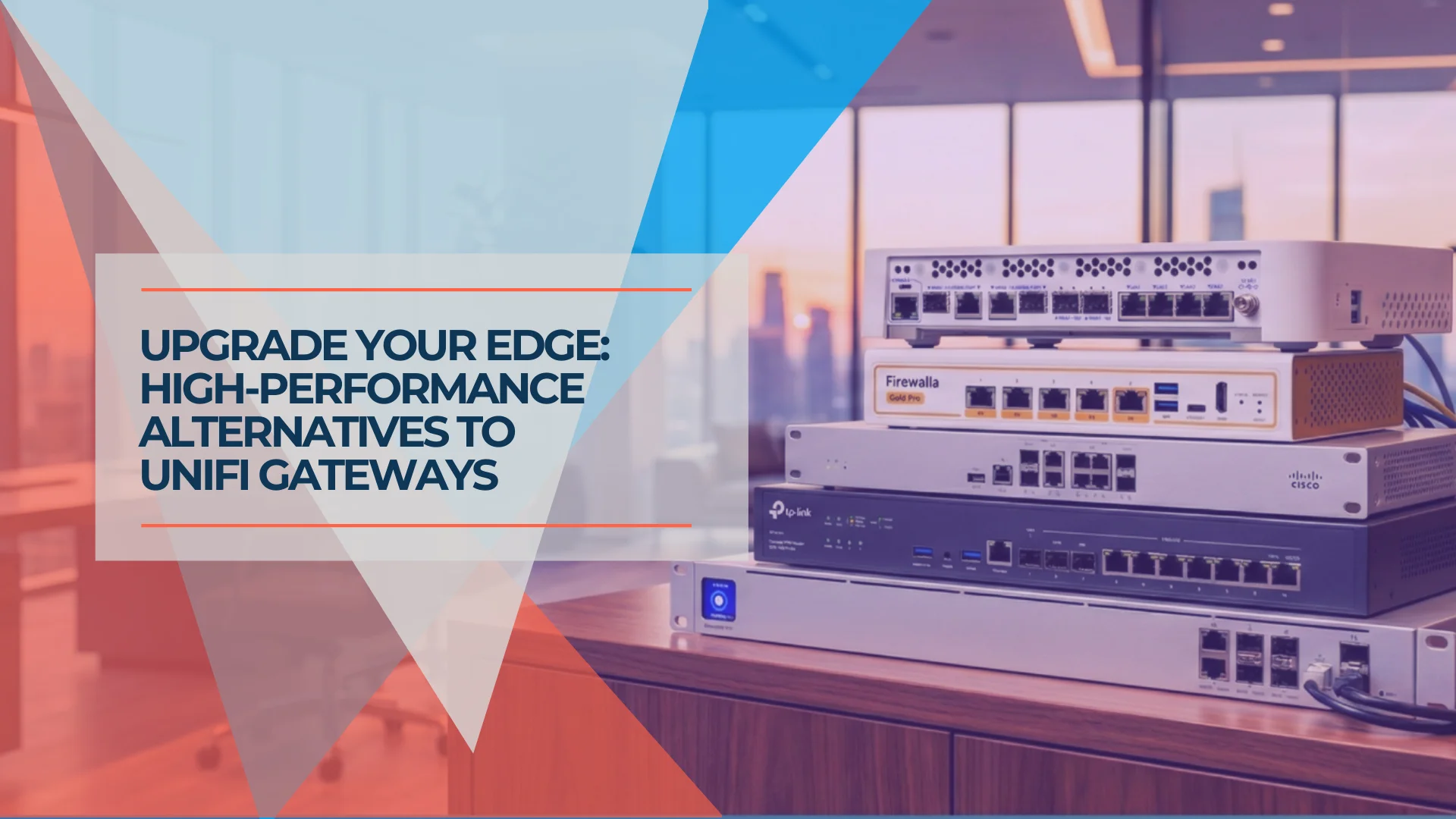
UniFi Cloud Gateway Alternatives: Hybrid Stack Guide (2026)
Explore gateway alternatives that pair beautifully with UniFi switches and APs. Compare UXG Series, Firewalla Gold Pro, Netgate pfSense, Meraki MX, and TP-Link Omada for your hybrid network.
17 min read
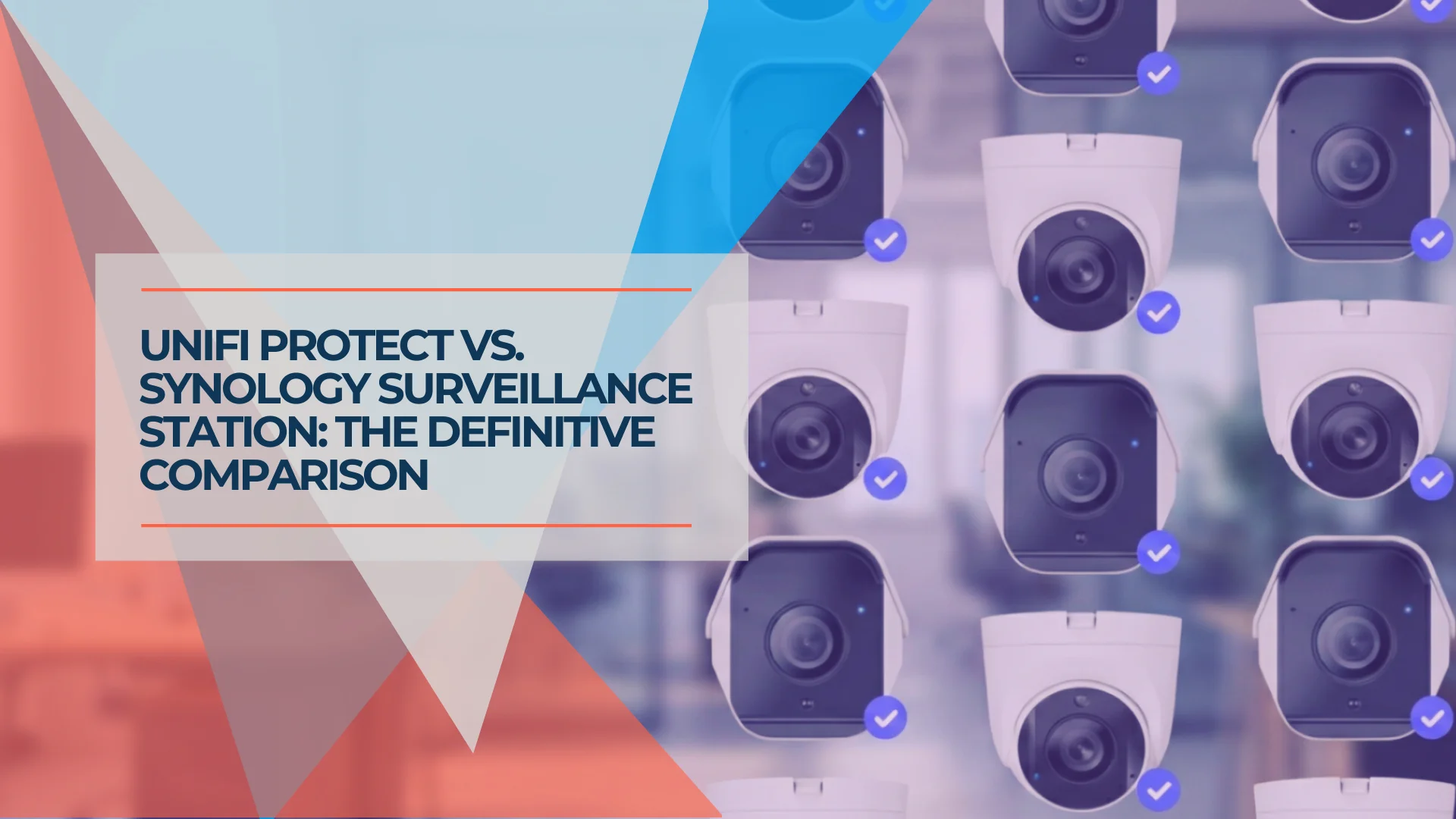
UniFi Protect vs. Synology Surveillance Station: A Complete 2026 Comparison
A detailed comparison of UniFi Protect and Synology Surveillance Station for small business and home security. We examine hardware, software, pricing, and real-world use cases to help you choose the right system.
14 min read
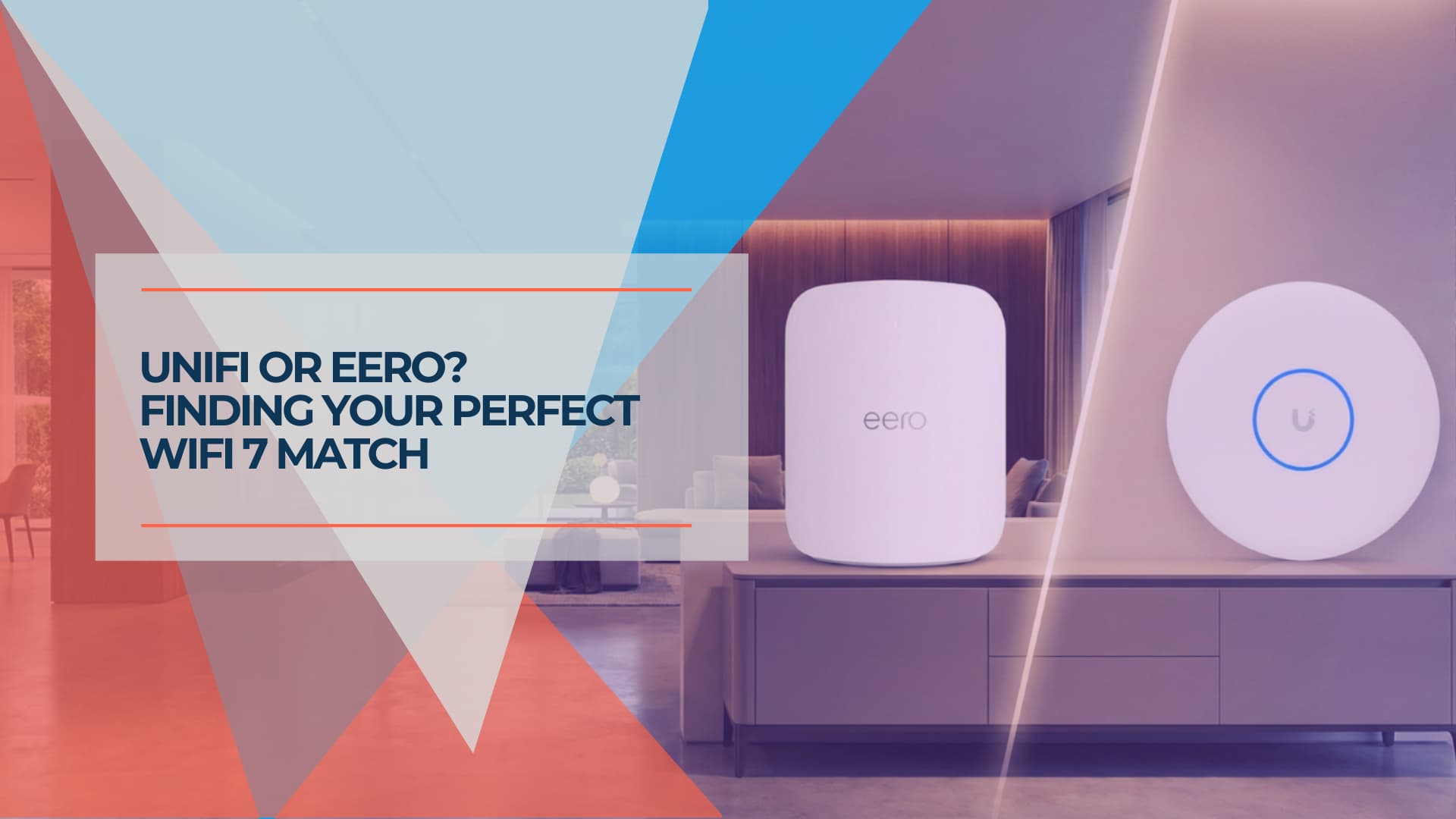
UniFi vs Eero (2026 Edition): The Complete Network Philosophy Guide
Compare UniFi and Eero in 2026. Dream Router 7 vs Eero Max 7, subscription costs, and the perfect setup for every home from hidden tech to enterprise performance.
12 min read